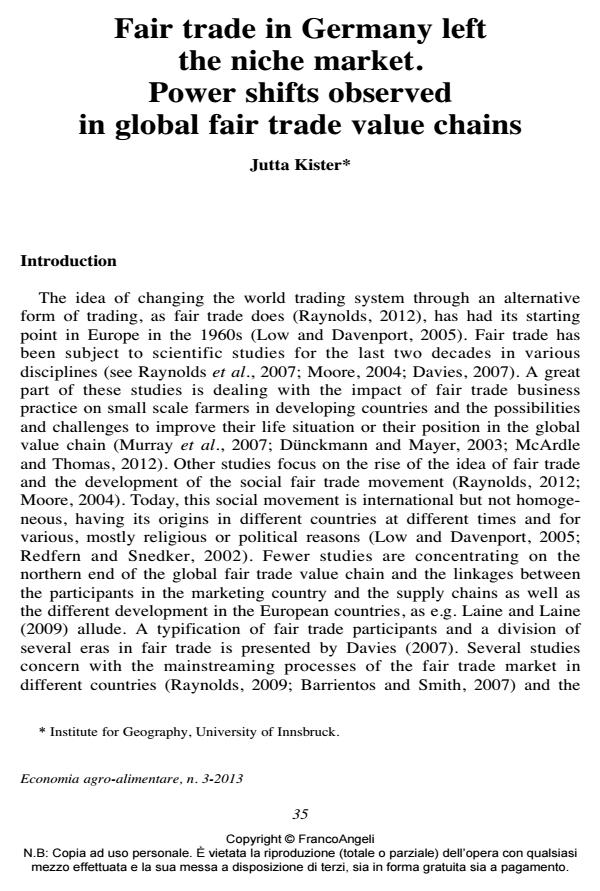Fair trade in Germany left the niche market. Power shifts observed in global fair trade value chains
Titolo Rivista ECONOMIA AGRO-ALIMENTARE
Autori/Curatori Jutta Kister
Anno di pubblicazione 2014 Fascicolo 2013/3
Lingua Inglese Numero pagine 20 P. 35-54 Dimensione file 262 KB
DOI 10.3280/ECAG2013-003004
Il DOI è il codice a barre della proprietà intellettuale: per saperne di più
clicca qui
Qui sotto puoi vedere in anteprima la prima pagina di questo articolo.
Se questo articolo ti interessa, lo puoi acquistare (e scaricare in formato pdf) seguendo le facili indicazioni per acquistare il download credit. Acquista Download Credits per scaricare questo Articolo in formato PDF

FrancoAngeli è membro della Publishers International Linking Association, Inc (PILA), associazione indipendente e non profit per facilitare (attraverso i servizi tecnologici implementati da CrossRef.org) l’accesso degli studiosi ai contenuti digitali nelle pubblicazioni professionali e scientifiche.
Fair trade is a fast growing niche market in Europe. Producer and consumer are linked via global value chains, based on the idea of solidarity manifested in a variety of social, economic and increasingly ecological criteria. In the German market, double-digit percentage growth is achieved by augmenting quality and diversity of fair trade products and selling sealed products via supermarkets and discounters. In consequence, the global value chains are subject to change; new actors not belonging to the social movement are getting involved. New steps of value creation are being inserted into existing value chains or shifted along the value chain, primarily into the consumer’s country. As a consequence, power shifts from south to north are observed. This aspect leads to the question whether the fair-trade-movement is still changing the conventional world trade system "from within" or if it is selling its reputation as a price for growth by cooperating with the market actors it is criticising. In this article the results of a study are presented, focusing on value chains of fair trade food products on the German market and their changes over time, on the upcoming of various new highly processed composite goods and on the new possibility for manufacturers and discounters to certify their in-house brand products.
Parole chiave:Global Value Chains, Fair Trade, Power structures, Germany
Jel codes: Q17, F63
- Operationalization of Interorganizational Fairness in Food Systems: From a Social Construct to Quantitative Indicators Ingunn Y. Gudbrandsdottir, Gudrun Olafsdottir, Gudmundur Valur Oddsson, Hlynur Stefansson, Sigurdur G. Bogason, in Agriculture /2021 pp.36
DOI: 10.3390/agriculture11010036 - Perspectives on Food in the Sustainable City Birgit Hoinle, Alena Birnbaum, Petra Lütke, in Urban Planning 10934/2025
DOI: 10.17645/up.10934 - Alternative Ernährungsnetzwerke als Alternative Ökonomien Marit Rosol, in Zeitschrift für Wirtschaftsgeographie /2018 pp.174
DOI: 10.1515/zfw-2017-0005
Jutta Kister, Fair trade in Germany left the niche market. Power shifts observed in global fair trade value chains in "ECONOMIA AGRO-ALIMENTARE" 3/2013, pp 35-54, DOI: 10.3280/ECAG2013-003004